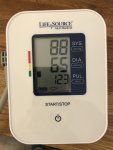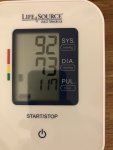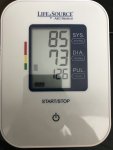xebex
Senior Member
- Messages
- 840
It seems that narrow pulse pressure is something that could be common in ME and /or OI and should be measured and tracked more?
I've never quite fit the criteria of POTs, I mean yes sometimes i do have POTS symptoms and lately i've had a standing HR of arounds 110-20 but i don't feel dizzy or faint and i don't have a blood pressure drop so i don't have OH either but my blood pressure is low/normal most of the time, and i will have a crash if i stand up for longer that 30minutes non stop (down to 2 mins on a bad day), it seems to be some kind of delayed OI and with it comes sleepiness and cognitive decline and mood swings aswell as flulike PEM the next day.
Anyway i have been monitoring my blood pressure this last week and noticed that my systolic and diastolic are very close which gives me a narrow pulse pressure, I looked it up (google diagnoses lol) and NORMAL is 40 - today mine is 12!! so - that's apparently heart failure or shock! WTF? does anyone else have this? is it really heart failure?
Thanks
I've never quite fit the criteria of POTs, I mean yes sometimes i do have POTS symptoms and lately i've had a standing HR of arounds 110-20 but i don't feel dizzy or faint and i don't have a blood pressure drop so i don't have OH either but my blood pressure is low/normal most of the time, and i will have a crash if i stand up for longer that 30minutes non stop (down to 2 mins on a bad day), it seems to be some kind of delayed OI and with it comes sleepiness and cognitive decline and mood swings aswell as flulike PEM the next day.
Anyway i have been monitoring my blood pressure this last week and noticed that my systolic and diastolic are very close which gives me a narrow pulse pressure, I looked it up (google diagnoses lol) and NORMAL is 40 - today mine is 12!! so - that's apparently heart failure or shock! WTF? does anyone else have this? is it really heart failure?
Thanks
Last edited:





